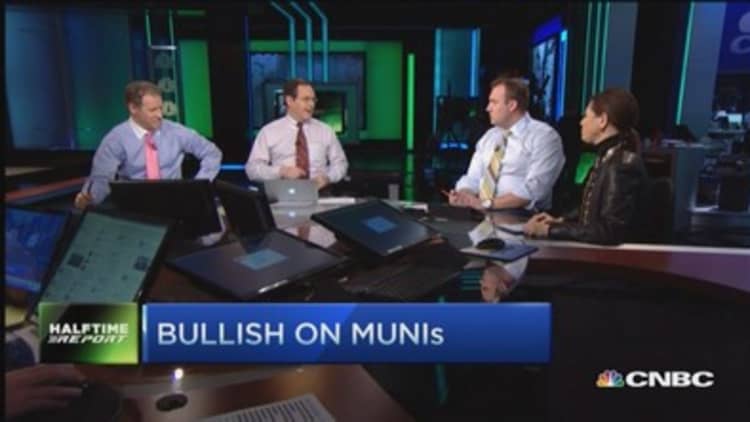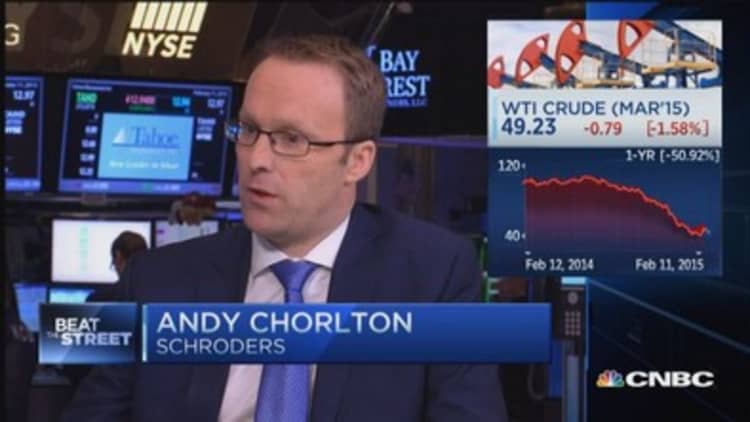With tax reform up in the air, no-tax or low-tax investments look a whole lot more appealing.
That's part of what's driving the surge in buying in the $3.7 trillion municipal bond market, which saw the largest inflows into mutual funds last week in more than seven years.
"This is the unwinding of the Trump trade or the Trump trade re-do," said Jeff Lipton, head of municipal research and strategy at Oppenheimer. The state and local bonds, in fact, have been outperforming Treasurys since the beginning of the year, with a total return of 2.75 percent, compared with 1.93 percent, he said.
Lipton notes that $1.63 billion went into municipal bond funds for the week ended April 12, the best since October 2009.
Municipal bonds are tax exempt, in that investors do not pay federal taxes on their returns, nor do they pay state income taxes if they buy certain bonds that are exempt in their home localities. The state and local bonds fund everything from schools to bridges and roads to public works projects.
In the days after President Donald Trump was elected, interest rates zipped higher as investors dumped bonds and investors loaded up on stocks. The bet was that there would be a reflation trade from his tax and stimulus programs, and bonds would weaken, with yields moving inversely higher on rising interest rates and inflation.
"Between Nov. 8 and Nov. 29, municipal bonds plunged relative to taxable bonds," said Jack Ablin, CIO of BMO Private Bank. "Since that time, the end of November and by the end of the year, they rallied back to where they were. Now they're holding their own against taxables, which would suggest there's no disadvantage, meaning no tax break."
"The bigger the tax, the bigger the advantage. The smaller the tax, the smaller the advantage," he said. Ablin pointed to the performance of munis in the iShares National Muni Bond ETF versus, which have held their own this year against the taxable bonds in ETF.

Treasurys and other fixed income investments have been pricing out tax reform in recent weeks, particularly since Congress and Trump failed to bring a bill to replace Obamacare to a vote on March 24. Stocks have become range bound, yet the is still up more than 9.5 percent since the election.
"I think the bond market had become very much oversold very, very quickly [late last year], and a lot of that sentiment was really based on expectations as opposed to reality, and now we are seeing expectations are being pulled back," Lipton said. "I think the desire for haven assets is likely to be more pronounced through the foreseeable future."
Lipton points out that municipal bond flows have been both positive and negative this year after weeks of positive flows last year.
The Trump administration has been pushing back expectations for a 2017 tax bill. Last week, Trump said health care comes before tax reform, and Treasury Secretary Steve Mnuchin said his original target of August for tax reform was too aggressive.
Goldman Sachs economists, in a note Wednesday, said it appears the timing of tax reform is slipping again. "If the legislative focus remains on health legislation through May, a vote on tax reform at the committee level might not occur in the House until July, which could make final enactment of tax legislation before year-end challenging. At this point, we expect that enactment is more likely in Q1 2018 than Q4 2017," they wrote.
But that could quickly reverse, if Washington pushes through health care or switches over to taxes.
"If we come into a scenario where the tax reform rhetoric picks up, and it seems like the president and Congress are more in sync, then investors will get to thinking about tax reform more as it relates to municipal demand," Lipton said.
The market for municipal bonds is dominated by retail investors, with 44 percent held by individual investors and another 17.5 percent in mutual funds. Banks hold about 12 percent and the balance is held by other institutions like life insurers and foreign entities, Lipton said.
To the muni market, both individual and corporate tax reform are important. The House tax plan reduces the corporate tax rate to 20 percent from 35 percent, though there is no agreement with the White House on how revenues would be generated to cover the reduction in taxes.
That difference between the current and anticipated tax rate affects the desirability of tax-exempt investments.
"If they go from 36 to 33 percent, most individual buyers of municipal securities are in the 25 to 28 percent, maybe a little higher, bracket, so you're not going to see a sharp dilution in demand. ... On the corporate tax side, I don't think the corporate tax rate is going to go to 15 percent. If it goes to 20, maybe 25 percent, I think that could impact demand from certain institutional buyers of municipal securities," said Lipton.
He said equivalent munis are trading at 91 percent of the 10-year Treasury. "We've richened up since last week. ... As those numbers increase, it means there's greater relative value buying munis versus Treasurys," Lipton said.
"As the tax reform debate heats up we could conceivably see these ratios go higher, meaning munis become cheaper relative to Treasurys. If you have lower tax rates that theoretically impact the demand of the asset class. It could also result in a shift in muni valuation. I think if we have a dramatic decrease in the corporate tax rate, that could result in a repricing of the muni curve," said Lipton.
Watch: Pro says muni's beginning to look rich



